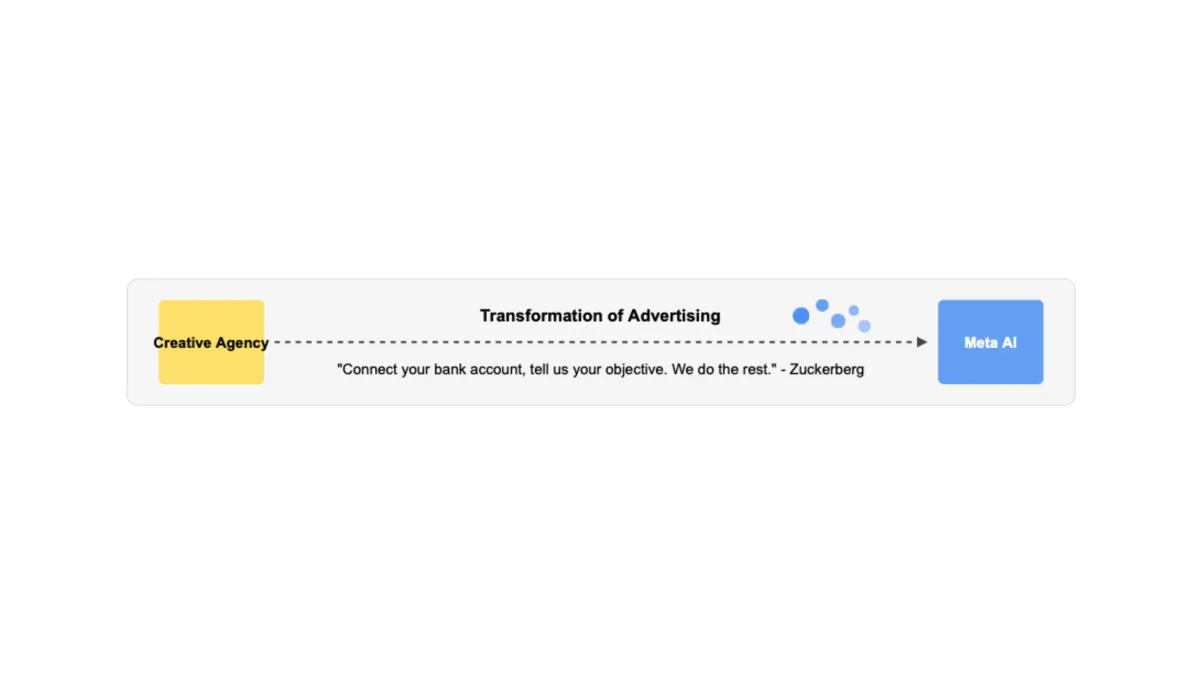
Mark Zuckerberg has unveiled his vision for a future where Meta's artificial intelligence effectively replaces traditional creative agencies, fundamentally transforming how businesses advertise online. This ambitious plan represents one of the most significant disruptions to the advertising industry since the advent of digital marketing.
Get the PPC Land newsletter ✉️ for more like this
During a recent interview with Stratechery's Ben Thompson on May 1, 2025, Zuckerberg articulated his goal with striking clarity: "You're a business, you come to us, you tell us what your objective is, you connect to your bank account, you don't need any creative, you don't need any targeting demographic, you don't need any measurement, except to be able to read the results that we spit out."
This statement encapsulates Meta's strategy to automate the entire advertising process from end to end. Rather than requiring businesses to produce creative content, determine audience targeting parameters, or analyze complex metrics, Meta's AI systems would handle everything automatically, optimizing in real-time for business outcomes rather than merely delivering impressions.
The approach represents a direct challenge to creative agencies whose primary function has been developing advertising concepts and content. If Meta's vision succeeds, businesses would simply provide their objective and budget, with AI generating all necessary creative elements—potentially making traditional creative development obsolete.
AI-generated "infinite creative"
At the heart of Meta's strategy is what Zuckerberg calls "infinite creative"—the ability for AI to generate an unlimited variety of advertisements tailored to specific audiences. This approach eliminates one of the most resource-intensive aspects of digital advertising: producing diverse creative assets to test effectiveness across different demographics.
"But there's still the creative piece," Zuckerberg explained, acknowledging that businesses traditionally "have a sense of what their message is or what their video is or their image, and that's pretty hard to produce." His solution is straightforward: "We just make it for them."
This represents a radical shift from current practice where creative agencies and marketing teams spend significant time and resources developing advertisements. Under Meta's new model, AI would generate countless variations of advertisements, test them in real-time, and optimize based on performance—all without human intervention.
Technology underpinning the transformation
Meta's creative revolution is powered by significant investments in artificial intelligence infrastructure. The company recently introduced its Generative Ads Recommendation model (GEM), which has already shown a 5% increase in ad conversions during initial testing. This model uses an architecture that Meta claims is twice as efficient at improving ad performance compared to previous approaches.
Additionally, Meta has expanded access to tools like Video Expansion for Facebook Reels, which automatically adjusts video aspect ratios by generating new pixels to optimize for full-screen formats. The company has also rolled out image generation capabilities to eligible advertisers and plans to test a virtual try-on feature that uses generative AI to place clothing on virtual models.
These tools represent the building blocks of Zuckerberg's vision, with each advancement bringing Meta closer to fully automated creative development. The company's increased capital expenditure—now projected between $64-72 billion for 2025—further demonstrates its commitment to building the infrastructure needed to realize this ambition.
Industry pushback and concerns
The advertising industry has responded with significant skepticism toward Meta's vision. Nilay Patel from The Verge reported that reactions from advertising executives were "withering," with one agency CEO expressing that "letting them make and also optimize creative is a scary concept."
Industry professionals have highlighted two primary concerns. First, brand safety remains paramount for most businesses, making them hesitant to surrender complete control over creative content. Second, many clients reportedly distrust Meta's measurement reporting, viewing it as the company "checking their own homework."
These concerns reflect the fundamental tension inherent in Meta's approach. While automation promises greater efficiency and potentially better results, it also reduces transparency and shifts control away from brands and their agencies toward Meta's proprietary systems.
Why this matters for marketers
For marketing professionals, Meta's AI creative strategy represents both opportunity and existential threat. On one hand, smaller businesses with limited resources may benefit significantly from having sophisticated creative automatically generated. Meta's tools could democratize access to high-quality advertising that previously required substantial expertise and budget.
Conversely, for creative agencies and in-house marketing teams, this evolution threatens to automate core functions of their work. The value proposition of creative professionals may need to shift toward strategy, brand development, and oversight of AI-generated assets—focusing on the "what" and "why" rather than the "how" of advertising.
The marketing community faces a pivotal choice: resist Meta's automation push and emphasize human creativity's unique value, or embrace these AI tools and evolve their role to focus on areas where human input remains essential. Neither path offers certainty, but both require acknowledgment that the landscape is fundamentally changing.
Early results suggest momentum
Despite industry concerns, Meta's financial results indicate that its AI-driven approach is gaining traction. In Q1 2025, the company reported advertising revenue growth of 16% year-over-year to $41.39 billion, with average price per ad increasing by 10% during the same period.
Particularly promising is Meta's Incremental Attribution capability, which optimizes for conversions that wouldn't have occurred without an ad being shown. According to Meta CFO Susan Li, advertisers using this feature saw an average 46% lift in incremental conversions compared to traditional approaches.
These results provide Zuckerberg with compelling evidence that his vision is not merely theoretical but represents a viable future for digital advertising—one where AI makes creative agencies increasingly unnecessary.
 PPC LandLuís Rijo
PPC LandLuís Rijo
The path forward
Meta's transformation of advertising represents more than a technological evolution; it signals a fundamental reorientation of how businesses connect with customers. If successful, Zuckerberg believes it will lead to advertising becoming "a meaningfully larger share of global GDP than it is today" by dramatically increasing advertising productivity.
For creative agencies, this reality presents an existential challenge. Those that adapt may find new roles in strategic consulting or brand development, while those that continue to focus primarily on creative production may face increasing pressure as AI systems become more sophisticated.
The future Zuckerberg envisions is one where businesses need only define their objectives and budgets, with everything else—from creative development to audience targeting to performance analysis—handled automatically by increasingly sophisticated AI systems. Whether this vision represents progress or peril depends largely on where one sits in the current advertising ecosystem.
What's clear is that Meta has committed fully to this direction, and with nearly a billion monthly active users already engaging with Meta AI across its family of apps, the infrastructure to deliver on this vision is rapidly taking shape.
Timeline of Meta's Creative AI Evolution:
- April 7, 2025: Meta announces update to privacy policy allowing use of public posts for AI training
- April 30, 2025: Meta reports Q1 earnings with 16% growth in advertising revenue and introduces GEM model
- May 1, 2025: Zuckerberg declares war on traditional advertising with "infinite creative" vision in Stratechery interview
- May 2, 2025: Meta's ad business soars with AI tools driving revenue growth as marketers adopt new features
- May 3, 2025: Industry reaction intensifies as advertising agencies express concerns about Meta's approach
- May 27, 2025: Deadline for users to opt out of having their content used for AI training
- Mid-2025: Meta plans full rollout of Incremental Attribution feature to all advertisers after 46% lift in test results

